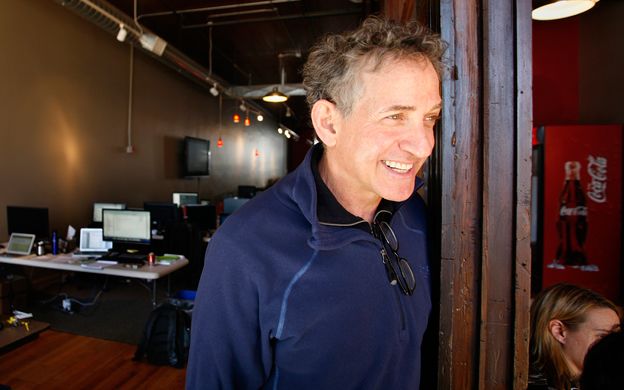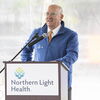2012 Business Leaders of the Year: ‘Leap of faith' paying off for digital gift card pioneer David Stone
When David Stone was 16 years old, he and a friend saw an opportunity to open a canteen at his high school in Worcester, Mass. After all, students had to walk a half mile or so to get to the nearest convenience store. So, the duo began selling soda, candy and other snacks on school property.
Stone says the store was a hit, with students lining up at the door. Business was so good, he says, they began donating 20% of their proceeds to the school.
Despite its success, the business was forced to close early in its second year.
"It was so successful, [the school] shut it down," says Stone, who is now the CEO of CashStar, a leader in digital gifting. "It made too much money."
It's that entrepreneurial instinct that led to the creation of CashStar, a leader in interactive digital gift cards.
Stone moved to Falmouth in 1997 to take a job at Unum. The outdoor enthusiast quickly became enamored with the state, staying after his Unum days, when he was traveling the globe for nearly eight years as a consultant.
Stone says his globe-trotting ways kept him from his wife and five children. "I was always traveling, missing birthdays, having to send something home, or buying some unfulfilling product in an airport shop and never feeling good about it," he says. "I said, 'There's really got to be a better way to do this.'"
Enter CashStar, the "interactive gifting and incentive company" that allows consumers of many of the nation's top retailers to send personalized, electronic gift cards to people. Each gift can be personalized with a 190-character message, a photo and/or a video.
The idea was hatched with the help of Steven Boal, the founder of Coupons.com who sits on the CashStar board of directors. Stone says he worked out the concept in the attic of his Falmouth home, and then began working his network of contacts looking for investors.
Plastic gift cards are a $100 billion a year industry, he says. With the rise of iPads and smart phones, people are increasingly looking to conduct business online and even use their phones to make purchases at a physical store.
"We're all living in the digital age," says the wild-haired Stone, while sipping tea at his Market Street office and listening to a mix of jazz, blues and folk music. "Having to schlep around plastic with you and having to buy plastic gift cards … it's ripe for change. [CashStar] is still a small percentage of it, but there's only one way it's going to go."
CashStar secured its first client on Oct. 29, 2008, in Gorham Ski & Bike. During an interview at his Old Port office, Stone, wearing a blue fleece jacket and blue jeans, walks over to one of the green walls of his modest corner office. There he points to a printout in an outsized frame. But Stone eyes it like a proud papa, since it is a copy of the first electronic gift card his company sent on behalf of Gorham Ski & Bike.
"It was really exciting," says Stone, who has started six companies, and says the first sale is always the one to savor. "It is really fulfilling to see some idea that you have — creating something out of the ether — and people actually using it."
Since then, the company has signed on more than 250 clients. In 2011, CashStar secured $28 million in venture capital to grow the business, which also broke into the Canadian market. It also grew its list of top U.S. retailers, adding Williams-Sonoma, Best Buy, CVS/pharmacy, The Home Depot, Staples, Chili's Grill & Bar and Gap.
For Stone, that first sale, along with the ensuing growth of his company, was something of an I-told-you-so moment. While seeking venture capital in Silicon Valley, potential investors seemed impressed by Stone's idea, but wouldn't give him funding since he wasn't in the Valley.
Pressure to relocate his company is always coming from somewhere, Stone notes, but he took a "leap of faith" based on his belief that he could build and maintain a successful company in Maine. In the CashStar lobby hangs a photo of U.S. Sen. Susan Collins, who recently visited the company, thanking Stone for his commitment to the state.
"We've had to buck that trend [of going to Silicon Valley] and fight and tell the world you can do this in Maine," he says, pointing to work ethic, loyalty and overall disposition of the local work force. "I believed it could be done here. I believed there was the talent here and the work ethic."
Stone says he plans on opening a California office soon that will concentrate on business development and sales, since many of his clients are out there. The engineering work will stay in Portland, where he is creating a more Valley-like workplace.
CashStar employees do not have to punch a time clock and are free to come and go as they please. They can wear shorts and sandals to work, and color and style their hair however they want. In addition to buying lunch once a week, Stone keeps the office kitchen stocked with soda, juices, fruits and snacks. Software engineers can kick back and play video games to blow off steam, and will soon be able to play Fusbol. Offsite activities include bowling, swim meets, kickball and the like.
Those perks, says Stone, are important to attract and retain talent, especially since they are asked to work long hours due to the startup nature of the company and its fast growth.
Stone says the international part of his business is growing faster than expected. Over Christmas, which accounts for 40% of the company's annual sales, he pushed his staff to work overtime to land an account in Canada. Against the odds, they succeeded, and the company received an extra $30,000.
Stone says he took $15,000 and used it to throw a big staff party, hiring the disco band Motor Booty Affair, and bought high-tech gifts to raffle off for the staff.
"You have to build the culture and environment so they want to stay," he says. "You want to work at a place that's fun, rewarding and exciting, where people care about you and where you make a difference."
In addition to his work force, Stone has built a leadership team to complement his strengths and weaknesses. As a passionate, creative and often demanding leader with strong convictions, Stone says he sought similarly opinionated individuals whose strengths were more organizational and oriented toward business.
While Stone says it was his instincts that put him at the front of the electronic gift card industry, he is well aware of the pitfalls of being over confident. On his office wall hangs a graphic depicting Napoleon's fatal march to Moscow.
"It's a lesson in hubris," Stone says. "Don't have visions of grandeur — it will kill you."
Register for the Business Leaders of the Year reception.
DOWNLOAD PDFs
Business Leader of the Year David Stone on CashStar's corporate culture
Read more
Introducing Mainebiz's 2012 Business Leaders of the Year












Comments